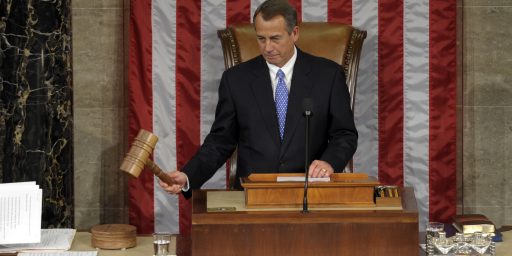Make A Budget Deal, And Move On To The Bigger Fight
Rather than fighting over the remnants of the FY 2011 budget, the GOP should make a deal and get ready for the bigger, and more important, battle ahead.
It looks like Congress is going to take us down to the wire this week on the budget negotiations meant to avert a government shutdown on Friday. Yesterday, President Obama became directly involved in the talks, partly in response to press commentary that he was sitting on the sidelines while the House GOP and Senate Democrats fought amongst each other. In the meantime, it doesn’t appear that the parties are any closer than they were three weeks ago when the last Continuing Resolution was passed:
With less than a week left before government funding expires, the rift between Republicans and Democrats on a budget agreement appears as wide as ever.
President Barack Obama on Saturday called House Speaker John Boehner (R-Ohio) and Senate Majority Leader Harry Reid (D-Nev.) and said Democrats and Republicans have agreed “to work off the same number” — $73 billion in cuts to 2011 spending.
(The $73 billion figure measures against the level proposed in the president’s fiscal 2011 budget 13 months ago. The first $40 billion represents a spending freeze at 2010 levels, rather than the increase the president sought. Another $10 billion in cuts have been made in two continuing resolutions funding the government for the last five weeks. The final $23 billion, which is still under discussion, would come from the final six months of the fiscal year, which ends Sept. 30).
But that number has not been accepted by Boehner, who is facing a potential rebellion among more conservative members of his caucus who are pushing for more cuts. Michael Steel, his spokesman, told POLITICO the speaker “repeated to the president that there is no ‘deal,’ and he will continue to push for the largest possible spending cuts.”
The current deal to fund the government expires Friday, and despite hints that a new agreement was emerging last week, the two parties appear to be no closer to a deal to avoid the first government shutdown in more than a decade.
At the same time, of course, Boehner has said publicly that a government shutdown would be a bad idea, so it’s entirely possible that what we’re seeing here is a public face from Boehner that’s meant as much to appease members of his own party as anything else. As I noted on Friday, though, it seems as though the parties are really closer than they appear to be, as long as you discount the Tea Party’s “all or nothing” approach to these negotiations as the silliness that it is:
The basic sentiment of the Tea Party crowd seems to be that the GOP should accept nothing less than the $61 billion in spending cuts that were passed as part of H.R. 1, even if that means shutting the government down. As much as I’d like to see $61 billion cut from the current budget, if not more, there’s one huge problem that the Tea Party folks are either forgetting, or simply refusing to recognize. The Republican Party only controls, as Boehner put it today, “one half of one third of the Federal Government.” A legislative strategy that refuses to recognize the fact that the Senate and Presidency are controlled by Democrats is simply unrealistic, and it isn’t really governing at all. If the House GOP can get a $33 billion deal out of the Democrats, they ought to take it, and move on to the next (and bigger) battle over the FY 2012 budget.
As The New York Times reports today, that fight is shaping up to make the arguments over the remainder of the 2011 budget seem tiny by comparison:
WASHINGTON — Congress has yet to settle its first budget fight of the year but is already about to move on to an even more consequential fiscal clash.
Even as the two parties struggled over the weekend to reach a deal on federal spending for the next six months and avert a government shutdown at the end of the week, House Republicans were completing a budget proposal for next year and beyond. It is likely to spur an ideological showdown over the size of government and the role of entitlement programs like Medicaid and Medicare.
The plan, which is scheduled to be unveiled Tuesday, will be the most ambitious Republican effort since the November elections to put a conservative stamp on economic and domestic policy. It involves far greater stakes for Congress and for President Obama — substantively and politically — than the current fight over spending cuts.
The outcome of that fight was still uncertain on Saturday as Congressional staff members assembled new proposals and the White House said that Mr. Obama had called House Speaker John A. Boehner and Senator Harry Reid of Nevada, the Democratic majority leader, to urge them to find an acceptable compromise. He reminded them that time “is running short.”
The longer-term budget proposal has been led by Representative Paul D. Ryan, a Wisconsin Republican who is the party’s leading voice on budget matters, and will go beyond numbers to provide policy prescriptions.
It will call for deep spending cuts again in 2012, chart a path to reducing the deficit and slowing the growth of the accumulating national debt, and grapple with the politically volatile issue of reining in the cost of entitlement programs, starting with Medicaid, which provides health coverage for the poor.
“We want to get spending and debt under control, and we want to get the economy growing, and we want to address the big drivers of our debt, and that is the entitlement programs,” Mr. Ryan, chairman of the Budget Committee, said in an interview. “We have a moral obligation to the country to do this.”
The efforts of Mr. Ryan, backed by Mr. Boehner and other Republican leaders, are certain to meet serious resistance from the Democratic-led Senate and from Mr. Obama. In many respects, the nasty fight over financing the government for the next six months has been a warm-up for the longer-term budget battle, which could be further inflamed by a debate over raising the federal debt limit.
By comparison, the fight over a few tens of billions of dollars in cuts over the next five months is virtually meaningless. Instead of expending additional political capital on the question of $61 billion vs. $33 billion, it seems to me that the House GOP would be smarter to get the best deal they can now and move on to a battle that is likely to take up the majority of the rest of the legislative year. The alternative is a government shutdown, with all the negative press coverage that will follow, followed by an eventual resolution that will be closer to the Democratic proposal than the Republican one. Considering the fact that they were initially balking at the idea of any cuts at all, the fact that Democrats are now apparently willing to agree to $33 billion in cuts strikes me as significant development. Rather than fighting over marginal items, the GOP should declare victory, then go home and prepare for the next battle.







“it seems to me that the House GOP would be smarter to…”
There’s your problem right there.
They wont shut down the government, but they absolutely have to take it down to the wire. The TP can only maybe be appeased if there remains no doubt that they deal must be accepted or a disastrous shutdown will happen. They will need to see Boehner writhing on the floor, bleeding as he accepts the deal, or else they will turn on him with a vengeance.
The house GOP is not shutting donw the government. The house passed a bill. It is the Senate Democrats who have not. They did not do it last congress when it was there duty and they still have not. There is no senate budget bill. What is there to negotiate? Air? That is all the Senate Democrats have to offer. Chucky Cheese Schumer let the cat out of the bag when he let it be known they hope to shut down the government. I have perfect proof democrats suffer from low IQ. They had an opportunity to pass a budget last congress when they held a majority in both houses. The people spoke and now they just barely control the Senate. In case some of you missed it, elections have consequences. The House GOP was sent there to do what they are doing. I am sorry Doug chooses to frame this as a GOP problem. Fool me once shame on you, fool me twice shame on me. In 2012 there will be a GOP President, Senate and House. The progressives (communists) can crawl back into their caves.
“In 2012 there will be a GOP President, Senate and House. ”
It continues to amaze me how this seems to be the goal rather than a means to the goal. One party rule? How Soviet!
Like it or not, if there are going to be any meaningful cuts, a Dem’s going to have to do it. It’s pretty obvious that the Republican base is only going to accept cuts that helps Republicans win electorally.
Too bad, then, that electorally-acceptable cuts are few and far between and almost never “meaningful.”
> One party rule? How Soviet!
Was not too long ago that the crowing about the “permanent majority” was on the lips of every member of the GOP. They did not seem to grasp then, nor do they now, that that is a fundamentally un-American concept.
Actually, it’s the Senate Republicans who have not, as they have filibustered every attempt to vote on a spending bill in the Senate.
@Tano
Why appease the TP? Their ideas are either crazy or dangerous or both. The very fact that we are talking about shutting down the government is proof of that. They generally operate on a false interpretation of history. They voted for a bill this week that shows no understanding of the constitution. They operate on some kind of my way or the highway mentality, which flies in the face of our system of governing. If they are serious about being part of the system they need to join the system and not expect us to join theirs.
Gee, looks like the Democrats will have to do something they have trouble doing. Putting the country before party politics. The GOP seems to understand we MUST cut spending. Hey Norm, did you notice how much GOP input was wanted or accepted when they passes Obamacare? The Tea Party was a response to that. The people, not unions or parties, but the people. Democrats could and should and were responsible to pass a budget last year. They failed to do so. Did you get that. It was their job and they did not do it. You defend their dumb asses all you want. They failed to do what we pay them to do. Now they bitch because the people who were elected to do the job are not doing it the way you communist SOB Democrats want. FOAD.
I agree with your sentiment. I certainly did not mean that WE should appease them. I meant Boehner and GOP leadership needs to appease the TP in order to make a deal. That is the political reality he faces.
@Wiley
What you call Obamacare is a republican program. Over 100 GOP amendments were included. So much for your rant.
@Wiley
What you call Obamacare is a republican program. Over 100 GOP amendments were included. As someone else said: you give stoners a bad name.
Ryan’s new plan is bizarre: raise taxes are 90% of americans(except the rich), but destroy medicare for those tax cuts on the rich.
Any concessions, any meeting in the middle, any compromise will be viewed by the Democrats as blood and the water and will make the next budget will much hard to do.
The Republicans have the choice of cutting the budget or supporting massive tax increases in the future. Any non-cut should be seen as a tax increase in the future. Any compromise is a compromise for higher taxes, more spending, more government.
As long as their is one wasteful program, one minority set aside contract, one pork barrel earmark, there is no room for compromise.
Let’s remember we are in this situation because a Democratic Congress with a Democratic President did not pass a budget last year. Blame the Republicans all you want, but please acknowledge the incompetence of the previous owners.
personally, I don’t want them to compromise to get 2% of the budget reduced. It’s like only going 98 mph towards the cliff instead of 100 mph an dpeople are bitching that we daren’t give up those extra 2 mph.
Sorry, meant to say deficit instead of budget in the last comment.
&CharlesAustin
On average this has happened 1.3 times a year since 1940. OMG it’s Obamas fault!!!
If your opinion is based on factual inaccuracies then your opinion is factually inactivate.
Hey Norm, reading is fundamental. The point isn’t that continuing resolutions haven’t ben used many times before. Try again.
@ca
So in 2007 the dems had to do the same thing because bush and the so-called republicans didn’t pass spending bills. In 95 the so-called republicans didn’t submit a revised budget. Incompetence? More like political posturing.
Sure, minus the $1.5T deficits.
I am glad to discover your great way of writing the article. Now you make it easy for me to comprehend and carry out the concept. Thank you for the article.